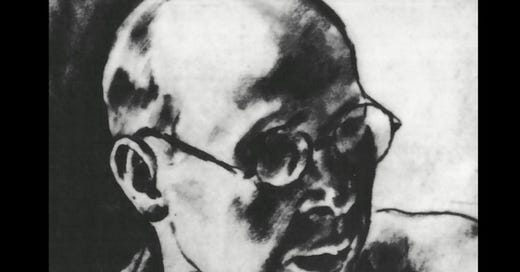To Read: "Letters to Emil" by Henry Miller
A weekly book recommendation with my favorite quotes.
In 2020, I started an ongoing series via my Instagram Stories (@conktales) where I posted a handful of quotes from whichever book I’d just finished—but only if it were one I’d recommend to others.
I would like to continue and add to that idea here on Substack; and if you have any book recommendations of your own, I beg you to please share them in the comments for all of us to benefit.
To purchase this week’s recommended book, please consider using the provided Amazon affiliate link here or at the bottom.
My rating: 4/5
In sum: I first saw Henry Miller in print at a bookshop near Big Sur. The title stood out due to its appropriateness: Big Sur and the Oranges of Hieronymus Bosch. I bought it without a second thought and since then I have read 6 of Miller’s works—none of them his fiction works.
Letters to Emil is a worthwhile read for the unfiltered thoughts of a struggling writer. It is a time capsule of the era Miller was operating in; he was born in 1891, and these letters were written to his lifelong friend, Emil Schnellock, whom he’d known since his early school days in Brooklyn—though most of these letters come from Miller’s expat period in Paris during the 30’s.
In essence, this book is Miller writing home. I found it fascinating to see how his thoughts about America in 1934 hold up to current events today (e.g. the p.145 quote below).
“Thank you, I’d rather go home, pretend I’m an artist and write some more flapdoodle. I suppose, in the last analysis, it comes down to this: that I really want to escape reality. I suppose I want to dream clean sheets, good meals, happy endings and all the rest of it. And I suppose, further, that I’m one of those lily-livered pups who hasn’t guts enough to go out and get a he-man’s job and slave for eight hours, maybe ten, for some guy who knows a little less than I do.” p.14
“Here and in the U.S. the middle class is still powerful. But gradually, it seems to me, we are moving toward the Roman stage of dissolution—the mob and the tyrants. The battle between money and blood, as Spengler says. A long drawn-out affair. In America I can see the makings of wonderful tyrants, wonderful sadists, degenerates, perverts, etc.—rising from the gangster world. And that army of wage-slaves gradually turned into robots who must be fed and amused—because they surrendered what inner life, what individuality they had, to the machine. The middle class will be ground to dust between the millstones, disappear entirely, and with them the notion of “democracy” and “freedom”-illusions.” p.145
“I don’t accept the world, and never will, I suppose—but I can live in it! Maybe that’s something. And furthermore I won’t have my books being an excuse for not living. I’m not going to live vicariously, in Art. How to live accordingly, and not be a hypocrite, not surrender, is in itself an art.” p.146
“And to say one does this for art, or for the world, is foolish. I am the gainer. I fought something out—to a conclusion. Not just tackling a problem, as so many finished writers do, but living through a thing, body and soul, till one almost dies of it. That is what I mean by creative effort. That is a surrender which yields a certain eternal sort of triumph—not paid for in fame or money or success. In two years I have learned much. I have established myself, for myself at least, as a real artist, one with the best. I mean it! I know my own worth now—the world will catch on slowly, maybe never—but I think it will. What I’ve got is vital and durable—in this rotten age or any age. I don’t fear. I’ve won my battle—the rest is tinsel, whether it be recognition or ignominy. And this, you will see, makes of me, or designates me, as a profound optimist. If I die tomorrow it won’t matter. I won’t die.” p.146
“A man doesn’t live many lives, as they say, unless and until he dies many individual deaths. Everything is won with pain and sacrifice, at the cost of bitter illusions.” p.147
“The more you read about the great ones the more you find that the decisive turning point in their lives is that period when they discover the South in themselves and live out the other hemisphere of their being. All wisdom, as I see it, consists in reconciling these two faces.” p.149
Have you read this book? Or any of Miller’s books? Feel free to comment below for a discussion.





